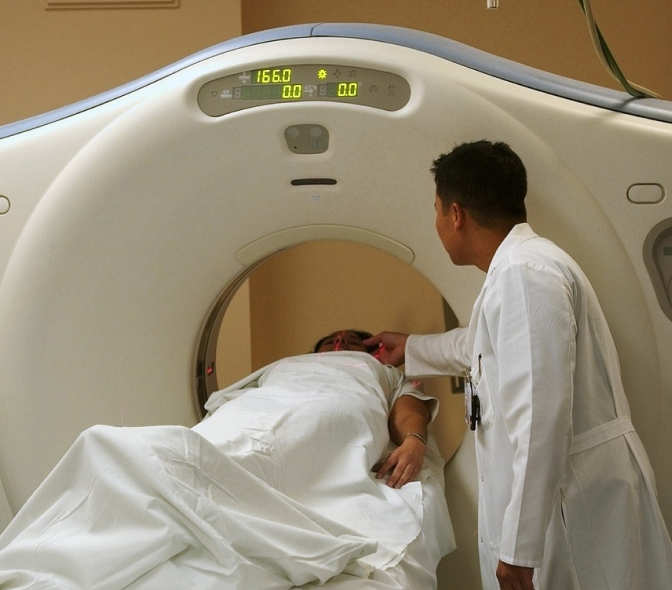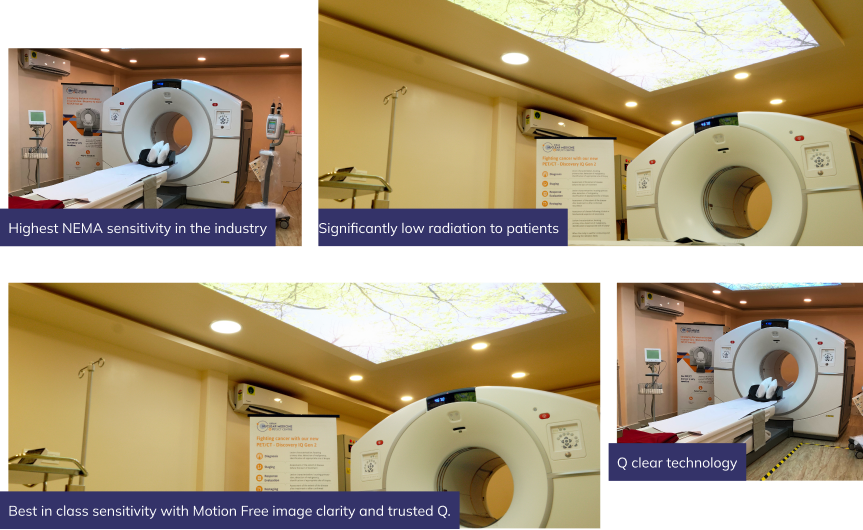Radioactive iodine therapy for thyroid cancer & hyperthyroidism
Home » Radioiodine Therapy
- Experience a whole new world of medicine - Theranostics - at the state of the art facility
- Combine your therapy with imaging for personalized, targeted treatment
- Clean, comfortable and premium isolation rooms which are regularly sanitized.
- Pioneers of theranostics in India

What is Radioactive Iodine Therapy?
Applications of RAI Therapy:
- Thyroid Cancer Treatment: After thyroid surgery, radioactive iodine therapy helps eliminate any remaining cancer cells, reducing the risk of cancer recurrence.
- Hyperthyroidism Treatment : Treatment: It's used to treat overactive thyroid conditions like Graves disease, targeting and destroying excess thyroid cells to normalize hormone levels.
- Differentiated Thyroid Cancer Ablation : Following thyroid cancer surgery, radioactive iodine therapy destroys any remaining cancer cells in the body.
- Palliative Treatment : In advanced thyroid cancer cases, it can alleviate symptoms and improve quality of life by targeting cancer cells and reducing tumor size.
- Diagnostic Imaging:Radioiodine scans help evaluate thyroid gland structure and function, detecting abnormalities like nodules or cancer spread.
- Research and Development : It's used in medical research to study thyroid function, metabolism, and to develop new treatment and diagnostic techniques for thyroid disorders.
Radioactive Iodine Cost
| 131 I – 15 mci Low dose iodine Therapy | 15,000.00 |
| 131 I – 30 mci High Dose Therapy | 45,000.00 |
| 131 I- 50 to 60 mci high dose iodine therapy | 65,000.00 |
| 131 I – 80 -100 mci High dose therapy | 75,000.00 |
| 131 I – 150 mci high dose therapy | 85,000.00 |
| 131 I – 200 mci high dose therapy | 95,000.00 |
What to expect during RADIO-IODINE therapy
- Capsule or Liquid Dose: A small capsule or liquid containing RAI is administered orally.
- Thyroid Uptake : The radioactive iodine travels through the bloodstream and gets absorbed by the thyroid gland.
- Targeted Radiation :The RAI emits radiation that specifically targets and destroys thyroid cells, including overactive or cancerous cells.
- Minimal Impact: Healthy tissues throughout the body are minimally affected by the radiation due to the thyroid s selective iodine uptake.

The Next Generation Technology is Here at Kiran PET CT - GE-DISCOVERY IQ GEN 2

Why Choose Us

Pioneering Theranostics
At Kiran Nuclear Medicine and PET CT Center, we're leading the way in theranostics, integrating advanced diagnostics with personalized treatment plans.

Precision and Effectiveness
Our commitment to theranostics means that you receive precise diagnoses and targeted therapies, leading to more effective treatment outcomes. We leverage cutting-edge technology and expertise to deliver the highest standard of care.

Personalized Medicine
We prioritize your individual health needs, providing customized treatment plans that consider your medical history, preferences, and treatment goals.
Meet Our Doctors
Frequently asked questions
Radioactive Iodine Therapy is a treatment approach used primarily for thyroid conditions, particularly thyroid cancer and hyperthyroidism (overactive thyroid). It involves the administration of a radioactive form of iodine, usually iodine-131, which is selectively taken up by thyroid cells. The radiation emitted by the iodine destroys the abnormal thyroid tissue, such as cancer cells or overactive thyroid cells.
The thyroid gland requires iodine to produce thyroid hormones. Radioactive iodine, given orally in the form of a capsule or liquid, is absorbed by the thyroid cells. The radiation emitted by the iodine damages the DNA of the thyroid cells, leading to their destruction. This targeted approach helps to eliminate abnormal thyroid tissue while minimizing damage to surrounding healthy tissue.
Radioactive Iodine Therapy is primarily used in the treatment of thyroid cancer, particularly differentiated thyroid cancer (papillary and follicular types). It is also employed in the management of hyperthyroidism caused by conditions such as Graves’ disease and toxic nodular goiter, where the thyroid gland produces an excess of thyroid hormones.
Radioactive Iodine Therapy is generally considered safe when administered by experienced healthcare professionals in appropriate clinical settings. The radiation exposure to other parts of the body is minimal because the radioactive iodine is primarily absorbed by the thyroid gland. However, there are potential side effects and risks, including temporary worsening of hyperthyroid symptoms, damage to salivary glands, and a small risk of long-term side effects such as radiation-induced cancer.
Before undergoing Radioactive Iodine Therapy, patients may need to prepare by following specific dietary restrictions and temporarily discontinuing certain medications that could interfere with the uptake of radioactive iodine. During the therapy, patients typically receive a dose of radioactive iodine orally and are then monitored for a period to ensure proper absorption and distribution of the radioactive substance. Depending on the dose and specific circumstances, patients may need to take precautions to minimize radiation exposure to others.
The effectiveness of Radioactive Iodine Therapy depends on various factors, including the type and stage of the thyroid condition being treated, the dose of radioactive iodine administered, and individual patient characteristics. In many cases, Radioactive Iodine Therapy is highly effective in reducing or eliminating abnormal thyroid tissue, such as cancerous cells or overactive thyroid nodules. However, additional treatments or follow-up may be necessary in some cases to achieve optimal outcomes.



